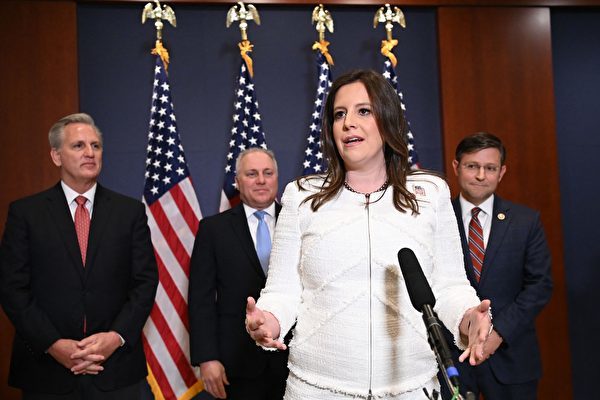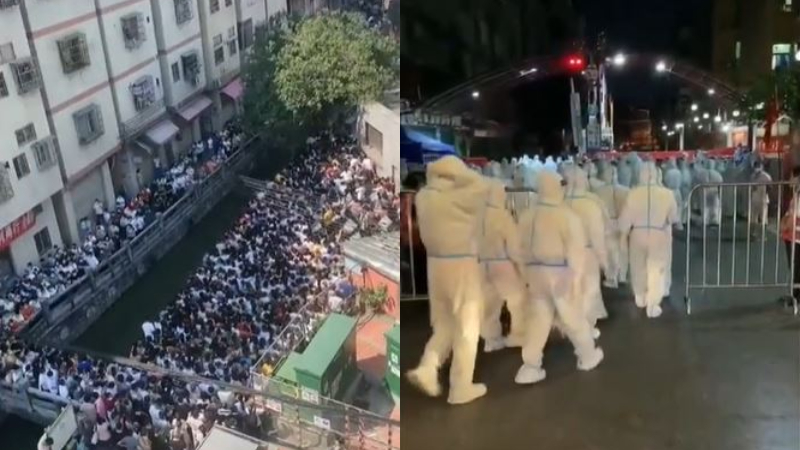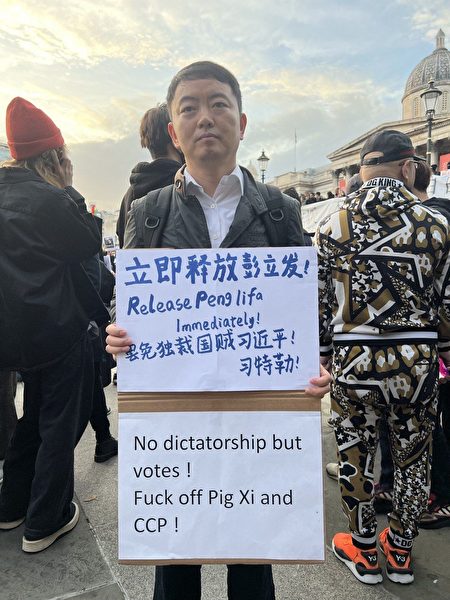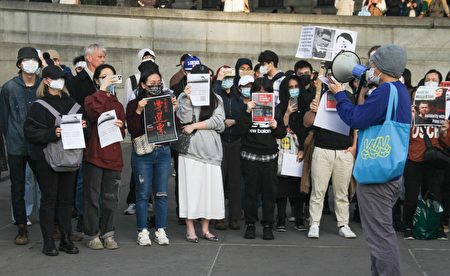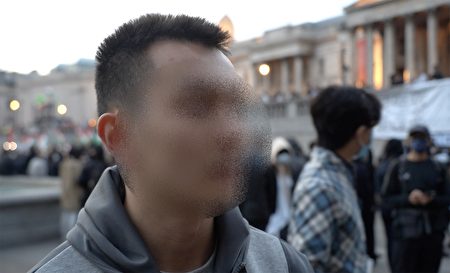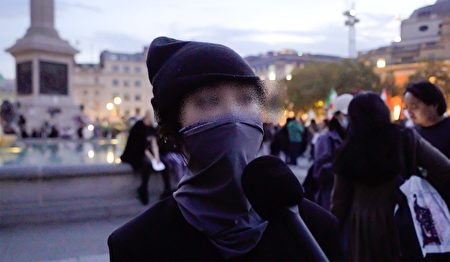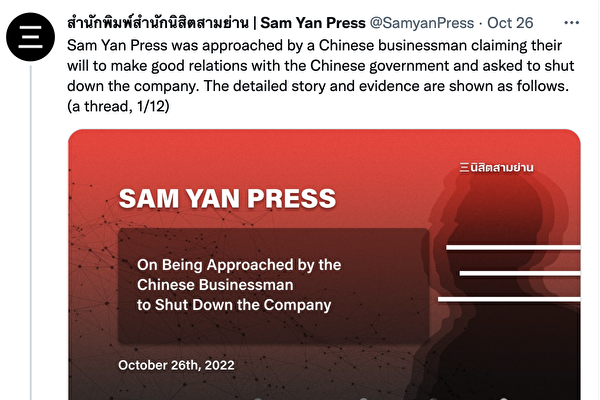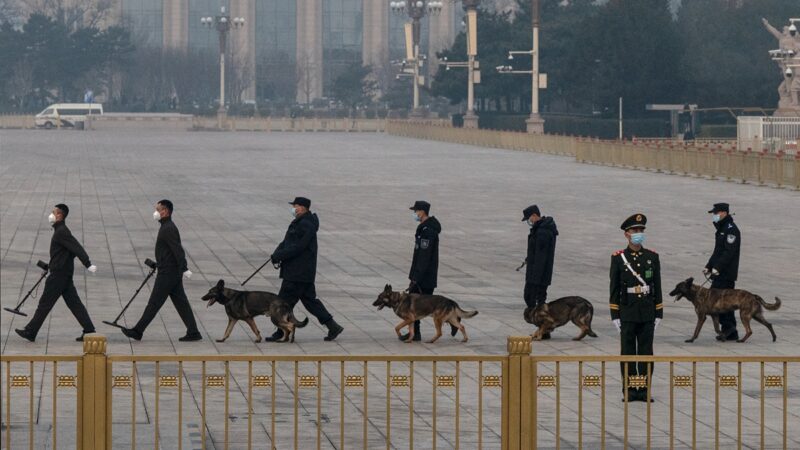Research, editing : Gan Yung Chyan, KUCINTA SETIA
News on U.S., CCP, disease control
News (1) to (3) / Editor : Li Hong / https://www.ntdtv.com/gb/2022/10/31/a103563872.html
News (1)
November U.S. state elections at a glance
Image : Minnesota Rep. Eric Mortenson speaks to a crowd gathered outside the State Capitol in St. Paul, Minnesota, on 22 May 2021. (Stephen Maturen/Getty Images)
In the mid-term elections in November, the American people will elect 435 members of the House of Representatives, 34 senators, and 36 governors but these elections are national, at the federal level.
Outside the federal election, voters will also vote on 133 regulations in 37 states and elect 6,279 members from 7,383 state legislature seats in 46 states.
As local and state media continue to shrink, cable news networks and digital news sites that focus primarily on national issues and the midterm elections have mushroomed, and state legislatures are getting less coverage. And the understaffed state legislature's news bureau is just a shell of its original staff.
But make no mistake: State legislators make policies, implement regulations, and issue decisions with far greater relevance and impact on voters' daily lives than federal Congress.
Impact on daily life
With the exception of defense, foreign policy, immigration, and interstate commerce, state legislatures are responsible for nearly everything else within the purview of government.
State lawmakers are key decision makers on a range of issues, including education, health care, infrastructure, elections, land use, sales taxes, guns and utilities, while controlling more than $2 trillion in annual balanced budget spending. After the U.S. Supreme Court struck down Roe v. Wade in June, that responsibility now also includes regulating abortion.
As U.S. Supreme Court Justice Louis Brandeis put it in 1932, state legislatures are “laboratories of democracy.” The top three annual issues in the 2023 Legislature's case are state budget, education and health care, in addition to issues related to marijuana, self-driving cars, energy, prescription drugs, data privacy, policing, sports betting, alcohol law , tax policy, family leave, technology and school choice related legislation.
State legislatures can vary widely in size and scope. Unicameral Nebraska has only a 49-member nonpartisan Senate, while New Hampshire has 400 representatives in the House of Representatives alone.
Legislators in four states (Texas, Montana, North Dakota and Nevada) do not meet in even-numbered years, while eight states (California, Illinois, New Jersey, New York, Pennsylvania) states, Michigan, Illinois and Ohio) lawmakers meet year-round, with occasional recess. Most state legislatures meet 30 to 90 days a year.
State lawmakers, however, are much busier than federal members of Congress during the busy annual legislative session. An analysis by Quorum States, a Washington state legislative-tracking service, recorded that state legislatures introduce 23 times more legislation each year than federal Congress. On average, each state legislator initiates or signs 33 statutes and passes about four statutes in each session.
According to Virginia-based MultiState, a state and local government relations and analytics firm, state lawmakers on average introduce nearly 250,000 pieces of legislation each year and pass about 30,000 pieces of legislation each year.
News (2)
Republican dominance
Of the nation's 98 state legislatures (Nebraska's legislature is nonpartisan, unicameral, and the other 48 states have two each, the House and the Senate), 61 have Republican majorities, while 37 others Controlled by Democrats.
Nationally, 3,978 state legislators are Republican, representing 52 percent of the state legislatures nationwide. Democrats control 47 percent of the seats.
Republicans control both chambers in 30 states, and Democrats hold Senate and House majorities in 17 states. Twenty-three states are Republicans on a three-game winning streak, meaning governors are from the same party. Democrats have won three straight in 15 states.
According to the National Conference of State Legislatures (NCSL), there are only three state legislatures that are split i.e. the Senate and House of Representatives are controlled by different parties, and only 12 states where the Senate, House and Governor are not controlled by the same party, which is 70 The second-lowest percentage in years "suggests that vote splits across the country may be waning".
The Senates of Alaska and Minnesota are controlled by Republicans, while the Houses of Representatives in both states are controlled by Democrats. Virginia is the opposite. Virginia, along with Louisiana, Mississippi and New Jersey, will not hold state legislature elections in November's midterm elections.
Republicans have been on the rise in state legislatures for the past 20 years. Democrats haven't held a national majority since 2010, when Republicans won 24 more chambers. Democrats have rebounded slightly since 2016, while Republicans have won a majority in the 66 chambers.
The November 8 election will be the first state legislative election since the post-2020 census redistricting.
"The political geography of many areas, especially the suburbs, has changed significantly, and the campaign in these areas deserves special attention," the NCSL said in its 2022 election preview. "It is likely that more people will come out to vote."
In addition, the NCSL noted that "hundreds of new lawmakers" were elected nationally in each election, but those numbers tended to be higher in the first elections after the once-in-a-decade redistricting.
"This year, we expect the number to be closer to 1,000, just under 15% of the national total," the group said.
The NCSL sees tight races in 21 state legislatures that control of both chambers could change hands. Over the past century, an average of 12 chambers have changed party control each election cycle, but the group noted that "this number has declined in recent years."
This trend is likely to unfold in the midterm elections. According to the NCSL, "while individual seats may be reversed, overall control of the entire house is unlikely to change".
"The Democrat-controlled chamber appears to be more tense than the Republican-held chamber," the group said. "This means that Republicans have an opportunity to gain more control."
News (3)
Most contested state assembly election
The 12 state Senate (five controlled by Republicans) and nine state Houses of Representatives (five controlled by Democrats) will likely reverse on Nov. 8, according to the NCSL.
Ballotpedia thinks 28 chambers in 19 states (16 Senate and 12 Houses) will be battlegrounds.
The state legislature analysis website CNalysis predicts that Republicans will win 147 more state legislative seats nationwide, including 41 to 42 seats in the Senate and 102 to 103 seats in the House of Representatives. Here's an overview of projections for the major state legislature elections:
Alaska - All but one state legislature seat is on the ballot. The NCSL rated the Alaska House of Representatives, which Democrats now control under a power-sharing deal, "likely to flip." CNalysis predicts that Republicans could gain as many as three House seats, which would give them a majority.
Arizona - All state House seats are on the ballot. Republicans hold a 16-14 and 31-29 advantage in the Senate and House of Representatives, respectively.
Ballotpedia identifies seven Arizona Senate battlegrounds, three in Democratic-controlled districts, four in Republican-controlled districts, and seven House race battlegrounds, three Republican-controlled and two Democrat-controlled, The remaining two constituencies are split. CNalysis made no predictions for the Arizona Senate race, but predicted that Republicans could gain a House seat.
Michigan - All state legislature seats are on the ballot. Republicans hold a 22-16 and 56-53 advantage in the Senate and House of Representatives, respectively. Voting Wiki lists 10 Senate races as battleground races, four in Democratic-controlled districts and six in Republican-controlled districts. It rated 28 House races as battlegrounds, 16 controlled by Democrats and 12 in districts occupied by Republican incumbents. CNalysis predicts Democrats will take two to three Senate seats and up to two House seats, nearly flipping both chambers.
Minnesota - All state legislature seats are on the ballot. Republicans hold a 34-31 majority in the Senate. Democrats control the House 69-64. Voting Wiki ranked 27 Senate races as battlegrounds, 13 in Democratic-controlled districts, 13 in Republican-controlled districts and one in independently-controlled districts. 42 House battlegrounds, 21 Democrats and 21 Republicans. CNalysis predicts no changes in the Senate, but expects Republicans to gain four or five House seats, which could flip the House.
Pennsylvania — Half of the four-year Senate seats and all 203 two-year House seats are on the November ballot. Republicans hold a 28-21 majority in the Senate and a 113-89 House advantage. Voting Wiki identified nine Senate battlegrounds, four in Democratic-controlled districts, four in Republican-controlled districts and one in independent districts. In the House of Representatives, there are 34 battlegrounds, 11 of which are Democrats and 23 are controlled by Republicans. CNalysis expects Republicans to gain Senate seats, while Democrats could chip away at the GOP's House majority by adding five seats.
New Hampshire - All state legislature seats are on the ballot. Republicans hold a 13-10 Senate majority and a 206-182 House majority. The NCSL and Ballotpedia identified the Senate as a potential flip, with eight Senate seats identified as battleground, with five held by Democrats and three held by Republicans. CNalysis does not expect major changes, with Republicans likely to gain a Senate seat.
WASHINGTON — Twenty-five of the 49 four-year Senate seats and all 98 two-year House seats are on the ballot. Democrats hold a 57-41 majority in the House and a 28-21 advantage in the Senate. The NCSL and Voting Wiki ruled the Senate as a battleground in three Democratic-controlled districts and two Republican-controlled districts. CNalysis expects Republicans to gain up to two Senate seats.
Oregon — 16 of the 30 four-year Senate seats and all 60 two-year House seats are on the ballot. Democrats hold an 18-11 advantage in the Senate and the House is split 30-30. CNalysis expects Republicans to gain up to two Senate seats and four House seats, potentially gaining control of the House of Representatives.
Nevada - Eleven of the 21 four-year Senate seats and all 42 two-year House seats are on the ballot. Democrats control Senate, 11-9, House of Representatives, 26-16. The NCSL and Voting Wiki rated the bicameral election as competitive. Voting Wiki categorizes four Senate races as battlegrounds, with two each in Democratic-controlled and Republican-controlled constituencies. There are 16 battlegrounds in the House, 10 in Democratic-controlled districts and 6 in Republican-controlled districts. CNalysis expects that Republicans could gain one Senate seat and up to three House seats, with the Senate likely to flip.
Maine - All 35 two-year Senate seats and 151 two-year House seats are on the ballot. Democrats hold a 22-13 Senate and 76-63 House advantage (three independents, nine vacancies). NCSL and Voting Wiki have identified the two chambers as competitive. Voting Wiki lists 20 Senate races as battlegrounds, 14 of them in Democratic-controlled districts. The House of Representatives has 53 battlegrounds, including 32 Democratic-controlled districts. CNalysis expects Republicans to gain as many as four Senate seats, close to flipping the House, and as many as four House seats.
News (4)
Rising Republican star Levitt is expected to be the youngest female congresswoman
Reporter : Chen Ting / Editor : Ye Ziwei / https://www.epochtimes.com/gb/22/10/31/n13856352.htm / Image : File photo of Republican New Hampshire House candidate Karoline Leavitt. (Courtesy of Karoline Leavitt's campaign website)
The U.S. mid-term elections are approaching, Republican rookie Karoline Leavitt is trying to represent New Hampshire in Congress, becoming the youngest person in the United States female congress personnel history.
In an interview with The Associated Press (link), Leavitt recalled filling out a White House internship job application in a college cafeteria in New Hampshire in 2018, while her friends were watching football games and enjoying tailgating parties. (tailgating).
"I remember thinking that if I had the opportunity, it would be worth missing any football game in the world," she said.
Leavitt got the job, eventually becoming President Trump's assistant White House press secretary and then communications director for Rep. Elise Stefanik of New York .
Inspired by Stefanik, Leavitt is now seeking her own House seat.
Image : File photo of Republican New Hampshire House candidate Karoline Leavitt. (Courtesy of Karoline Leavitt's campaign website)
When elected in 2014, Stefanik, then 30, was the youngest female congresswoman in the United States. Now, Levitt, 25, is expected to make history again on Election Day, Nov. 8.
Levitt, a Republican who supports Trump, will become the youngest member of the next Congress if she defeats two-term Democratic Rep. Chris Pappas in the tightest race of the year.
Trump has officially announced his support for Levitt. "Caroline Levitt is amazing. Vote for her to win. She has my full, complete support," he said in a statement.
Stefanik, now the third-ranking Republican in the House, supported Levitt early on, calling her "a rising star in the Republican Party who will carry the torch of conservative values for generations to come."
Image : Elise Stefanik speaks to reporters after her election as chair of the U.S. House Republican Caucus. (Mandel Ngan/AFP via Getty Images)
Mid-term elections have traditionally been viewed as referendums on the incumbent president. Under a Biden administration, however, the U.S. faces high inflation, a surge in illegal immigration and a rise in crime, which analysts believe gives Republicans an opportunity to regain control of both the Senate and the House of Representatives.
According to a forecast on the website "Real Clear Politics" (link), Leavitt's NH1 constituency is currently "leaning to the Republicans."
The Associated Press pointed out that the NH1 constituency has a history of multiple party flips. The NH1 district flipped five times in seven elections before Pappas won the seat in 2018. The constituency includes New Hampshire's most populous cities, Manchester, Portsmouth and rural communities further north.
Leavitt backed Trump's claims about the outcome of the 2020 presidential election, arguing that there was a vote dispute.
Pappas criticized Leavitt for taking extreme views and said her claims about the 2020 election were "not based on fact or reality" and were "dangerous."
Leavitt argued that Pappas and House Speaker Nancy Pelosi "are the real extremists," citing their support for the John Lewis Voting Rights Promotion Act, which would require the establishment of national automatic voter registration and allow for All voters vote by mail and will weaken states' Voter ID Laws.
Leavitt's policies also include strengthening parents' educational choices and increasing domestic energy production. She also has the support of Republican Gov. Chris Sununu.
"Washington is broken, and if we keep sending the same people back there, it won't fix it," Sununu said.
Leavitt and Pappas also sparred over inflation, social safety measures and abortion.
Some Democrats have criticized Levitt for not holding elected office and lacking bipartisan experience but Levitt said her experience working in the White House prepared her for Congress, and the West Wing "is perhaps one of the fastest-paced and most stressful work environments."
She also said that being young would be an advantage in going to Congress.
While campaigning at her alma mater, Saint Anselm College, she said bipartisan members of the U.S. Congress, often twice her age, were "a problem for young voters who really want a voice."
News (5)
Poll: 79% of voters think U.S. is 'out of control'
Reporter : Li Xin / Editor: Ye Ziwei / https://www.epochtimes.com/gb/22/10/30/n13855903.htm / Image : Nearly 80 percent of Americans believe the current state of the United States is "out of control," according to a new poll conducted ahead of the U.S. midterm elections. On November 5, 2018, voters cast their early midterm election ballots at a polling place in Los Angeles County, California. (Frederic J. Brown/AFP via Getty Images)
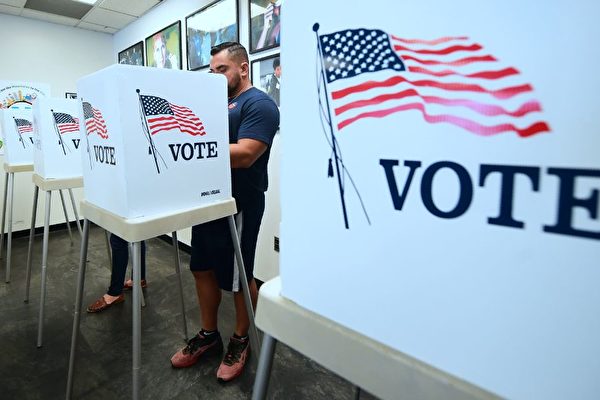
A new poll conducted before the U.S. mid-term elections shows that nearly 80% of Americans believe that the current state of the United States is "out of control".
A joint poll released by CBS News and British polling firm YouGov on Sunday (30 October) found that 79% of respondents thought the situation in the United States was "out of control" and 21% of respondents believe the situation is "under control".
When asked how they felt about the current state of the U.S., 73 percent of respondents said it was getting worse, and 36 percent said it was getting better.
On a partisan basis, among respondents, 48% of Democratic registered voters think the country is in good shape, compared with just 12% of Republican registered voters and 18% of independents.
Regarding U.S. President Joe Biden, 56 percent of respondents disapprove of the job he has done as president, while 44 percent approve.
The poll, conducted a week before the midterm elections, found that Republicans are still in a good position to win control of the House of Representatives. The poll's baseline model shows that of the 435 seats in the House of Representatives, Republicans are on track to win 228, while Democrats lead the race in 207 seats.
The poll also showed that while voters in both parties will vote positively, Republicans will turn out higher. Specifically, on Election Day, there will be a surge in turnout among white voters without a college degree, and a large number of this group supported former President Trump.
Those who care more about democracy support Democrats, while the majority of those who care more about a strong economy support Republicans, echoing the bipartisan campaign message.
The poll, which was conducted between 26 October and 28 October, included 2,119 respondents, with a margin of error of plus or minus 2.4 percentage points.
Video (1)
Brazil's general election results, the current president is in the game? Biden and the CIA are suspected to be behind the scenes. Bannon Blog Reveals the Truth. The attack on Pelosi's husband has become more and more dramatic as more details leak out. Lincoln's famous words wake up voters. | New Horizons Issue 807 20221031
Video (2)
Big things happen in China! The CCP urgently deploys troops to Zhengzhou! Xi Jinping wants to clean up? Decisive battle! Just this week? Renminbi assets plummeted; Urumqi locked down and the sky turned green! Netizens: Get the talent green code
Image : Video Screenshot
News (6) to (7) / Editor : Lin Qing / https://www.ntdtv.com/gb/2022/10/30/a103563593.html
News (6)
Staff "escape the epidemic" Zhengzhou Foxconn secretary's defense was deleted
Image : Due to the outbreak of the epidemic, the large-scale "fleeing" return of Foxconn employees in Zhengzhou, which has hundreds of thousands of employees, has caused social concern. (Video screenshot synthesis)
员工大“逃疫” 郑州富士康书记发自辩文被删
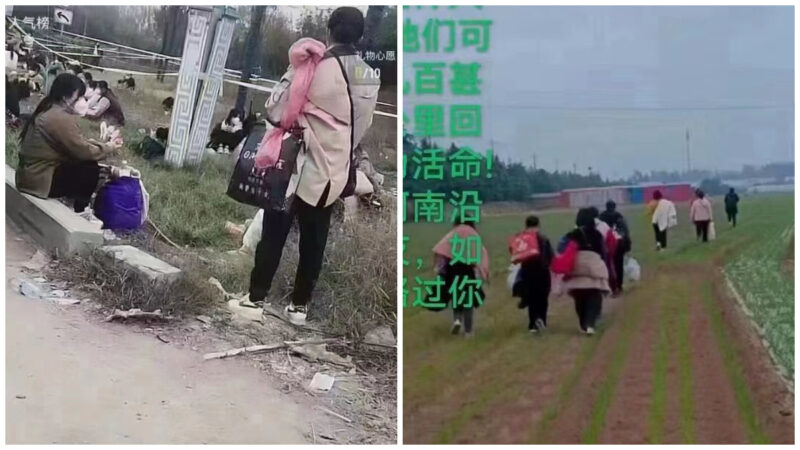
An epidemic broke out at Foxconn in Zhengzhou, which has hundreds of thousands of employees. When the large-scale "fleeing" of employees returning to their hometown on foot attracted social attention, it is said that Su Dongxia, Secretary of the Party Committee of Zhengzhou Foxconn, sent the message. A text defending the leadership drew attention but was later deleted.
In the past few days, a picture of Foxconn employees "fleeing" has appeared on the mainland social platform. The picture shows a large number of Foxconn employees walking on the road back to their hometown and even in the fields with plastic bags in their hands. There are also banners with "food supply points for returnees" provided by enthusiasts, and put some mineral water, dry food and other materials for passing Foxconn employees to pick up.
A self-proclaimed Foxconn 2022 employee wrote an article about the epidemic situation in the factory area, saying that the epidemic situation appeared on 8 October but it did not receive attention. On the 14th, closed-loop management was adopted. The factory area has long been cross-infected and the epidemic has spread.
In order to motivate employees to go to work, the factory still implements incentive measures. Full-time employees can receive RMB 50 per day. Employees who are not present will have no epidemic prevention materials and no meals to receive. Employees are asked to find ways to solve the problem.
"In the face of disaster, everyone is so insignificant. Like every employee, we have the same wish: to live well." He said, he did not expect this to become an extravagant hope, "We just want to eat a normal meal and watch A glimpse of the outside world."
There are also self-media articles saying that because the factory is usually responsible for food and lodging, many migrant workers have no reserves. Because the factory is unable to operate due to the control of the store, life has become a big problem. Even the working meals are mostly box lunches and instant noodles, and many people report that the food is seriously rotten and cannot be eaten.
In addition, the workshop worked overtime to complete the output, and there were new infections in the factory area every day, which caused people to panic. Coupled with the problem that the confirmed employees could not be transported in time, many employees in Henan Province decided to return to their hometowns immediately, and many employees closer to Zhengzhou decided to return to their hometowns on foot.
Pictures and videos leaked from inside Foxconn went viral on social media, sparking outrage from Chinese netizens, who accused the company of concealing facts and downplaying the situation. The topic "#zhengzhoufoxconn" was once trending on Weibo, a popular social platform in China.
However, in response to external criticism, Su Dongxia, secretary of the Zhengzhou Foxconn Party Committee, issued a public text in the early morning of 30 October, alleging that the handling of the epidemic in the factory area was arduous, saying that "the 15th day of working and living in the company, every day, I worked hard and spared no effort."
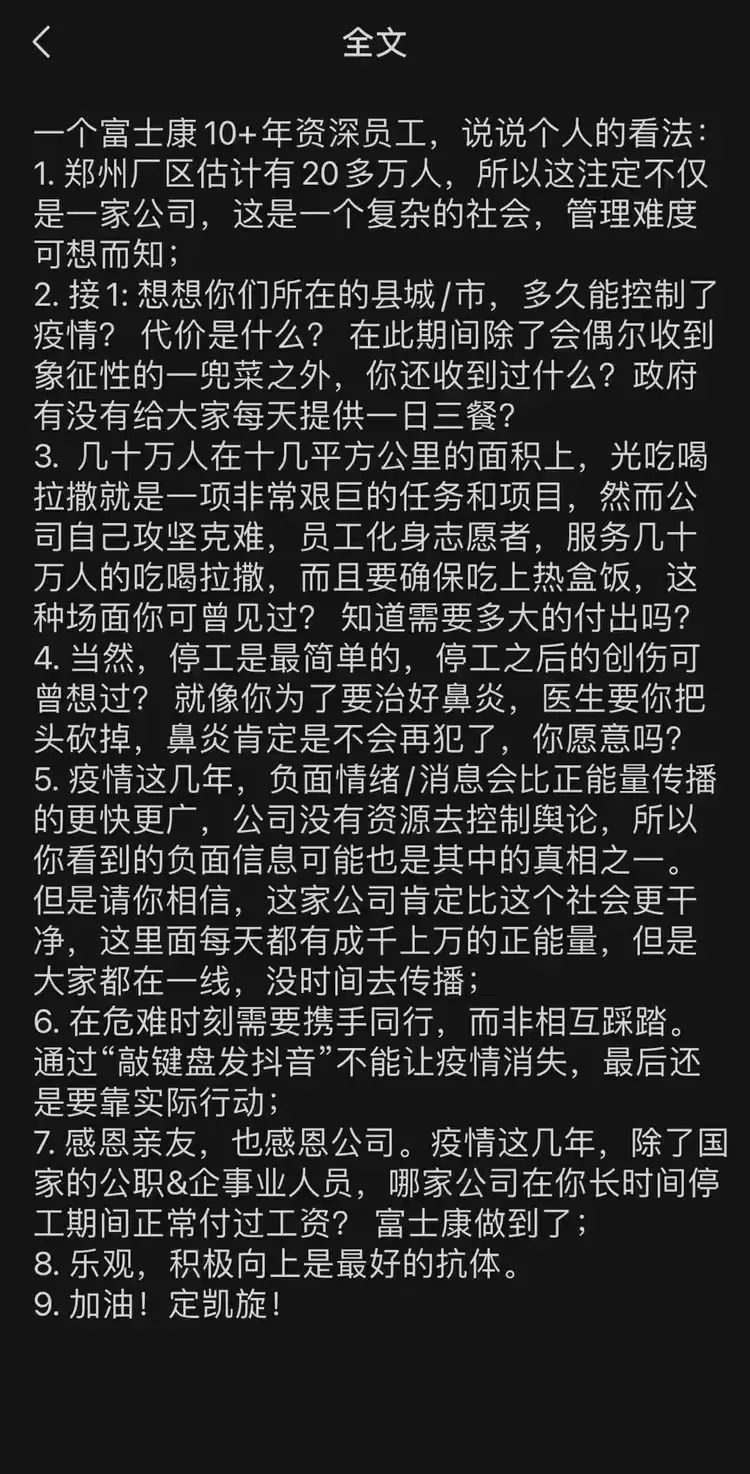
Image : Web Screenshot
She also said that there are more than 200,000 people in the Zhengzhou plant, and it is very difficult to manage. After the outbreak, the internal efforts were made to mobilize resources, and there was little external support.
In response to criticism from the outside world that Foxconn did not do a good job in ensuring supply, Su Dongxia asked how long it took for your city to control the epidemic at a cost, "During this period, apart from the occasional token bag of vegetables, what else did you receive? Has the government provided you with three meals a day?"
She also said that the company does not have the resources to control public opinion, and some negative information may also be one of the truths, "but please believe that this company is definitely cleaner than this society."
However, the portal website "NetEase" that originally published this article has deleted the article.
In response to the concerns of the outside world, Hon Hai Group issued a statement on the 30th saying that with the cooperation of the park and the local government in epidemic prevention, the epidemic has been gradually controlled. The statement added that the government later agreed to resume dine-in meals to improve the living conditions of employees. At the same time, for some employees who want to return to their hometowns, "point-to-point" return home services will be provided from 30 October.
After the 20th National Congress of the Communist Party of China, the expectation that the CCP authorities would gradually ease the epidemic control to save the economy came to nothing. Guangzhou, China's fourth-largest city by economic output, put more streets and communities under lockdown measures on the 27th.
News (7)
Nucleic acid screening in Yangpu District
On 28 October, Shanghai, the largest city in China and an important economic center, once again conducted nucleic acid screening of all 1.3 million residents in Yangpu District. During the testing period, the entire district was put into silent management, all public facilities were closed, and residents were isolated at home.
According to statistics, as of 24 October, a total of 28 cities in China were under some kind of closure and control measures, involving a population of about 208 million. These cities and population contributed about 25.6 trillion RMB to China's GDP. This is equivalent to about a quarter of China's overall economic output in 2021.
News (8)
Guangzhou cancels 888 flights in one day, Armed Police Hospital closes
Reporter : Luo Tingting / Editor: Wen Hui / https://www.ntdtv.com/gb/2022/10/31/a103563876.html / Image : At the end of the 20th National Congress of the Communist Party of China, the epidemic broke out in Guangzhou, and there were horror scenes where tens of thousands of people gathered to do nucleic acid tests. The authorities mobilized a large number of epidemic prevention personnel and armed police to station. (Video screenshot)
After the 20th National Congress of the Communist Party of China, the outbreak of the epidemic in Guangzhou was closed in many districts, and there were horrific scenes where tens of thousands of people gathered to do nucleic acid testing. The authorities dispatched a large number of police and epidemic prevention personnel to station. Guangzhou Armed Police Hospital was closed, and Guangzhou cancelled 888 flights on 31 October 2022.
The Guangdong Health and Health Commission reported that on 30 October, there were 289 new local confirmed cases in the province, including 232 in Guangzhou, 21 in Shenzhen, 2 in Shantou, 19 in Foshan, 2 in Shaoguan, 12 in Meizhou and 1 in Jiangmen.
There were 468 new local asymptomatic infections, including 295 in Guangzhou, 9 in Shenzhen, 80 in Foshan, 2 in Shaoguan, 76 in Meizhou, 3 in Dongguan, 2 in Jiangmen and 1 in Qingyuan. Because the CCP has been covering up the epidemic, the real infection data cannot be known to the outside world.
In the past few days, Guangzhou has implemented severe lockdown measures. According to flight data, as of noon on October 31, Guangzhou Baiyun Airport had cancelled 888 flights that day, with a cancellation rate of 69.00%.
Except for Guangzhou, Urumqi, Hohhot, Zhengzhou and other places, the flight cancellation rate has been close to 100%. Zhengzhou Airport planned 675 flights on the 31st, and 665 flights have been cancelled, with a cancellation rate of 98.52%.
Guangzhou's Haizhu District is the hardest hit area by the epidemic. In the evening of 28 October, the official refuted the rumor of "closing the island", but on the 30th, it immediately announced the strengthening of social epidemic prevention and control measures, which is essentially a complete closure and control.
Haizhu District claimed that strengthening epidemic prevention and control is to prevent gatherings and reduce cross-infection of people. However, the video posted on the Internet shows that on October 28, a nucleic acid testing site in Haizhu District was crowded with people, and tens of thousands of people huddled together to do nucleic acid testing.
A female citizen filming a live video said: "When I came here, I was dumbfounded, really dumbfounded. So many people, so gathered, and the queue was so dense."
Some citizens lamented: "From 9 am to 1 pm, it was hot and crowded, and I almost killed my life by doing nucleic acid."
On the 28th, the Guangzhou Armed Police Hospital suddenly announced the closure of clinics, and some people watched from the outside of the hospital.
On 30 October, a large number of epidemic prevention personnel "Dabai" and police stationed in Haizhu District, Guangzhou. The video posted on the Internet shows that Dabai, wearing a white protective suit, lined up in a long line, filed into the closed area, and there were a large number of police stationed by the roadside.
A female citizen exclaimed in the video: "There is another batch, and the road is full of people in white."
Another video shows that on October 28, a large number of police academies came to be transferred to Guangzhou to help prevent the epidemic. Some netizens questioned, "This is to learn how to suppress ordinary people in advance." "Guangzhou epidemic is out of control? Is it like this? I am afraid it is to find reasons for the military management! Let's see."
The Haizhu District, Huadu District, Baiyun District, Panyu District and Yuexiu District of Guangzhou have all experienced epidemics and implemented lockdowns and suspended dine-in services.
Guangzhou's continued epidemic lockdown has hit the local economy hard. Now, except for the nucleic acid test site, the large commercial districts in Guangzhou are deserted, and many shops are closed. Guangzhou Textile City has also been "silent". The former city that never sleeps is now very quiet and very deserted.
Netizens lamented: "The Guangzhou epidemic reminds me of a saying - pressing the gourd to make a scoop...it's too difficult." "For the real economy, what I can feel is the big impact visible to the naked eye." "It's the common people who starve to death, and those who eat public meals are not worried at all." "It's been three years, and it's already collapsed. On paper, it says development, but in reality, it doesn't develop at all."
"There is no income, sitting on the mountain and empty, it's more scary than getting sick." "Everyone can't stand it anymore, anyway, I'm going crazy, it's hard to find a job during the epidemic, breaking up in different places, working two points and one line, nucleic acid every day... …”
News (9)
British Chinese support the Sitong Bridge incident: Chinese people yearn for freedom
Reporters : Jenna, Tianyu / https://www.epochtimes.com/gb/22/10/30/n13855748.htm / Image : On 29 October, in Trafalgar Square in London, England, hundreds of Chinese held a rally in solidarity with Peng Zaizhou. (Jenna/Epoch Times)
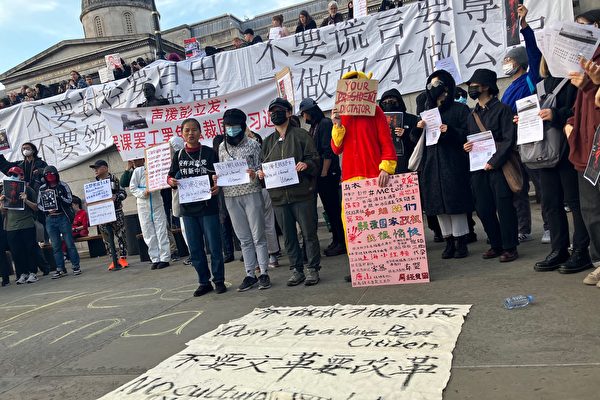
On 29 October, in Trafalgar Square, London, England, hundreds of Chinese held a solidarity with Peng Zaizhou (real name Peng Lifa). The rally, demanding that the CCP stop the blockade and carry out political reform and other demands.
The rally location is located in the most central part of London, only a few minutes' walk from Chinatown. It is one of the main tourist attractions in London, and the rally attracted a large number of passing Chinese, tourists and locals to stop and watch. Various banners except Peng Zaizhou In addition to my own demands, there are also a large number of voices calling for the overthrow of the CCP's rule.
The Peng Zaizhou Incident, also known as the "Sitong Bridge Incident", occurred on October 13 this year in the Sitong Bridge section of the Third Ring Road in Haidian District, Beijing. At that time, Peng Zaizhou hung a huge banner on the bridge, which read: "No nucleic acid but food, no lockdown but freedom, no lie but dignity, no Cultural Revolution but reform, no leader but vote, no slavery but be a citizen" "Class strike, strike and recall the dictator Xi Jinping." He also created wolf smoke to attract public attention and looped banner content with tweeters. Peng Zaizhou was arrested by the police shortly after, and his whereabouts are still unknown.
Image : Mr. Chen, a member of the China Democracy Party, believes that the CCP is most afraid of the public speaking out. (Jenna/Epoch Times)
Different from the previous demonstrations against the CCP, which were mainly launched by pro-democracy groups and faith groups, the participants this time were more students studying in the UK. Mr. Chen, who is a member of the Chinese Democratic Party, has a deep understanding. He said: "Peng Lifa represents the deepest desire of the suppressed Chinese people, so we admire him very much, especially today we found that international students have come out. To be able to take this step , is particularly touching, we think China has hope, and if everyone can stand up, I think the Communist regime will fall sooner or later."
Mr. Chen believes that these movements overseas will definitely have an impact on China: "The Communist Party is afraid that (the people) will hear different voices, and we need to make such voices heard. If we overseas Chinese are unwilling to speak up, they are even less likely to speak out in the harsh domestic environment."
"We also want to let the world know what the Chinese really think, what is the most real pursuit of the Chinese people, the Chinese people long for freedom, long for the end of the Communist Party's rule, and even more for the end of Xi Jinping's rule. Let the world know the true face of the Communist Party. What is it, because the existence of the Communist Party is not only an oppression of the Chinese people, it is actually a threat to world peace and tranquility." Mr. Chen also hopes that there will be more such spontaneously organized marches and rallies by the Chinese in the future.

Image : A mainlander disguised as a CCP epidemic prevention officer believes that many people still do not know the truth. (Jenna/Epoch Times)
An interviewed dissident expressed his admiration for Peng Zaizhou's behavior, "I call him a warrior. In addition to his superficial demonstrations, he also has his own thoughts on the democratic process. He is not a reckless man, which makes me more reverence." He also called on the Chinese to first learn more about the truth, "Actually, many people just don't know (the truth) and need more publicity."
Image : Mr. T called for the elimination of the bloody and authoritarian government of the CCP. (Jenna/Epoch Times)
Mr. T, who goes by the pseudonym T, came to the rally this time in response to China's excessive epidemic prevention and Xi Jinping's rule. "After the 20th National Congress, Xi Jinping was re-elected. I am very disgusted. He is like an emperor. China needs democracy and freedom, and now everything in the country, the ban, and the suppression of ethnic minorities, make me very angry."
He mentioned that the current domestic propaganda is all brainwashing and fraud, "China is not all pink, many people wake up after they come out, and they think of resistance. I hope that this movement will also have Shanghai's (April Voice) movement can awaken the people in the country, fight for democracy and freedom, and eliminate the bloody, centralized government of the CCP.”
Image : Mr. Zhu (the blue-clothed person holding the microphone) spoke at the rally, recounting all the horrific movements that China has launched since taking power, including the Great Famine, the Cultural Revolution, and the recent suppression of Falun Gong and Hong Kong people. Chinese compatriots wake up quickly, or the future of the Chinese nation will be ruined." (Jenna / The Epoch Times)
Mr. Zhu, who majored in politics himself, said he came here to participate after seeing the notice of the march in the Instagram and WhatsApp groups. He also said bluntly that he participated in this kind of gathering for the first time, and he has been very low-key in China. "I finally have a channel here, and more importantly, I have the courage to speak my voice." He believes that many Chinese people actually agree with Peng Lifa. Thought, but did not dare to come out, even overseas, for fear of suppression by the CCP regime.
Mr. Zhu appealed to everyone not to be pessimistic, believing that China now wants to be a prelude to the drastic changes in Eastern Europe in the late 1980s, "This is the first to overthrow the dominoes, Xi Jinping has been in power for ten years, and it is rare to see such a large-scale (demonstration) , especially overseas groups.”
Mr. Zhu also said that if political reform occurs in China in the future, it must come from internal and external driving forces, such as the drastic changes in Eastern Europe at the end of the last century. This is a turning point, and China will soon undergo a big change, everyone will no longer feel political indifference, and will stand up and speak for themselves."
External factors require this kind of movement to influence the Western people. "Their democratic mechanism can be converted into votes through the opinions of the people, forcing the government to formulate policies and push their politicians to support the arrested free people." At the same time, I am very happy to see Chinese from different countries and regions get together to participate, "As the blood of the Chinese nation, we stand together to speak for freedom and the same belief, this is the new identity, this is us and the people of Hong Kong-Taiwanese connection."
Image : Mr. Song called for more diverse voices to break the CCP's one-sentence rule. (Jenna/Epoch Times)
After seeing someone retweet the rally information on Twitter, Mr. Song was very interested, so he stopped by the way to participate, "He (Peng Zaizhou) is very brave, the risks he has to take at home, and the risks we take abroad can't be compared. He's inspired a lot of people, especially young people to overcome their fears."
Mr. Song said bluntly that many people around him, including his own relatives, are peaceful, even little pinkies, "The CCP will make people feel that these parades, sticking slogans, etc., are very childish behaviors, making it impossible for people to act. , let alone go further. The Chinese generally lack experience in such protests and demonstrations, take your time.”
He believes that to change the views of the Chinese people, we should start from ourselves, and at the same time popularize civic awareness to the surrounding people. "Especially the common sense education of politics, every sober person should do more, try more different channels, It is more important to let your voice be heard by others.”
"Little pinkies haven't heard a voice different from the Communist Party for a long time. The Communist Party's propaganda is too powerful, so when they hear a voice that is different from the official propaganda, they will be stimulated and can't accept it, so they must continue to have more diverse voices slowly wake up."
Image : Ms. Luo believes that participating in this rally is her social responsibility and obligation. (Jenna/Epoch Times)
Ms. Luo said that it is her responsibility to stand up. "As people who can go abroad, I have been much luckier than many people in China. I think we have relatively more social responsibilities. Responsibilities and Powers of a Citizen."
She believes that many mainlanders are willing to stand up and speak out this time, indicating that the situation in China must be very serious. "The policy of dynamic clearing should be abandoned. I don't think this policy can be maintained. No matter what the government wants to do, human lives are in the end. Human life should be treated as human first."
Video (3)
A bigger storm is coming, and the CCP’s weaknesses are unexpectedly exposed; he: Changes have appeared, which is related to China’s future [Cross-Strait News]
News (10)
The Xi faction makes a strong debut, and the CCP's center of gravity is unbalanced
Reporter : Zhang Mingjian / Editor : Lian Shuhua / https://www.epochtimes.com/gb/22/10/30/n13855690.htm
Xi Jinping and his cronies control the entire set of the CCP's highest authority, but the CCP regime's center of gravity is also tilted and out of balance.
After the 20th National Congress of the Communist Party of China (22 October), nearly 70% of the members of the Central Committee of the Communist Party of China, the highest authority of the Communist Party of China, are new faces, and the ratio of personnel turnover has not been as high as that in more than 30 years. There were 204 members of the last Central Committee of the Communist Party of China, and about 69 remained.
The current CPC Central Committee consists of 205 members, including seven members of the Politburo Standing Committee including Xi Jinping, and more than 20 Politburo members. They are at the top of the power pyramid of the Communist Party of China. The Politburo Standing Committee is the highest decision-making body of the Communist Party of China.
According to the organizational structure of the Communist Party of China, only officials who have entered the Central Committee and become members of the Central Committee are eligible to advance to become leaders of the Communist Party, or to serve as provincial or ministerial-level officials, as well as to be the main leaders and senior officials in the police and military systems of the Communist Party of China. rank officials.
Xi Jinping, the re-elected general secretary of the Communist Party of China, ended the rule of power transfer over the past 30 years and broke the original pattern of factions within the party. After October 22, Xi Jinping's cronies crowded the top of the power pyramid - the Central Committee of the Communist Party of China, and Xi Jinping no longer has a close political opponent within the CCP. No one has the political capital to challenge him.
Columnist Zhang Tianliang told The Epoch Times that, in fact, Xi Jinping broke the power distribution mechanism formed within the CCP after Deng Xiaoping 30 years ago—people from different factions divide power in proportion, and then give each other some face. Zhang Tianliang believes that after Xi Jinping is re-elected, he will launch a major purge within the party to eradicate dissidents.
Since Deng Xiaoping, the CCP's political strongman, there have been two major political factions within the CCP, one is the Jiang faction headed by former party leader Jiang Zemin, and the other is the regimental faction headed by former party leader Hu Jintao. Amid the infighting between the two political factions, Xi Jinping ascended to the post of General Secretary of the Communist Party of China in November 2012, before Xi Jinping had no cronies of his own.
This year is the year of the CCP’s five-yearly redistribution of power. Both the Jiang faction and the Tuan faction have suffered heavy setbacks from the Xi Jinping faction. The backbone members of both factions have not entered the new leadership core of the CCP, and very few can enter the Central Committee. Among them, Hu Jintao, the head of the regimental faction, was taken away from the 20th conference in front of many Chinese and foreign reporters, shocking the outside world, and seemed to be rehearsing what would happen next.
Some analysts believe that although Xi Jinping's cronies dominate one family, there will also be different forces within him, and new entanglements of interests will arise. Conflicts can also arise between the old factions. It is foreseeable that the CCP's internal confrontation will intensify and the crisis will intensify.
Currently, officials from Fujian in the Xi faction are the most powerful. Representatives include Wang Xiaohong, Minister of Public Security of the Communist Party of China, and He Weidong, Vice Chairman of the Military Commission. These people have begun to take on the characteristics of political factions.
Shi Shan, an expert on China issues, said in a live broadcast of NTDTV on 22 October that in fact, there are many political factions within Xi Jinping's cronies, and officials from Fujian are the big winners in the CCP's reelection process.
Shi Shan said, "There will also be factional struggles within the Xi faction. Just like during the Cultural Revolution, Mao Zedong's cronies also fought each other, and some people ended up dying worse than Mao's political opponents."
After the CCP established its political power in 1949, it has been mired in factional and line struggles for a long time. Among them, the Maoists have almost always occupied the dominant position, and Mao Zedong has become a Stalin-style dictator. By the time of Mao Zedong's death in 1976, factors including infighting had brought the CCP regime to the brink of collapse.
After the Cultural Revolution, the political strongman Deng Xiaoping ushered in the era of oligarchic governance (the "Central Advisory Committee of the Communist Party of China" in Deng Xiaoping's era was in essence the highest decision-making body of the CCP at that time, namely the political oligarchy governing body), and relaxed the control of economic activities, making the CCP The regime gets a respite.
Hu Jintao, the former leader of the Communist Party of China, is the successor of Deng Xiaoping's ruling philosophy, and he is also the successor of Deng Xiaoping's designated party leader every generation.
Zhang Tianliang said, "Xi Jinping's monopoly of power and Hu Jintao being forcibly removed from the meeting mean that the era of Deng Xiaoping has come to an end."
Newslink
150+ researchers funded by U.S. Government now work for Chinese Communist Party



